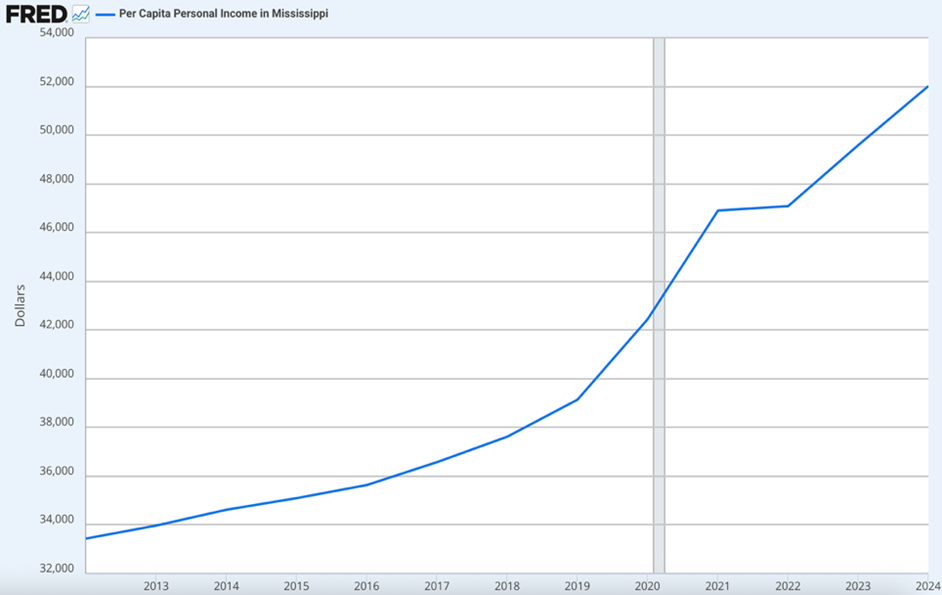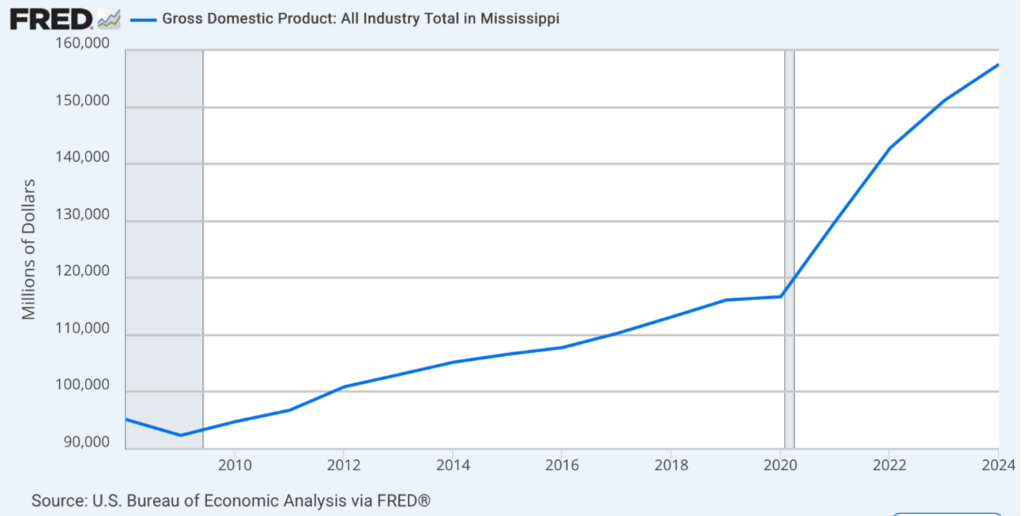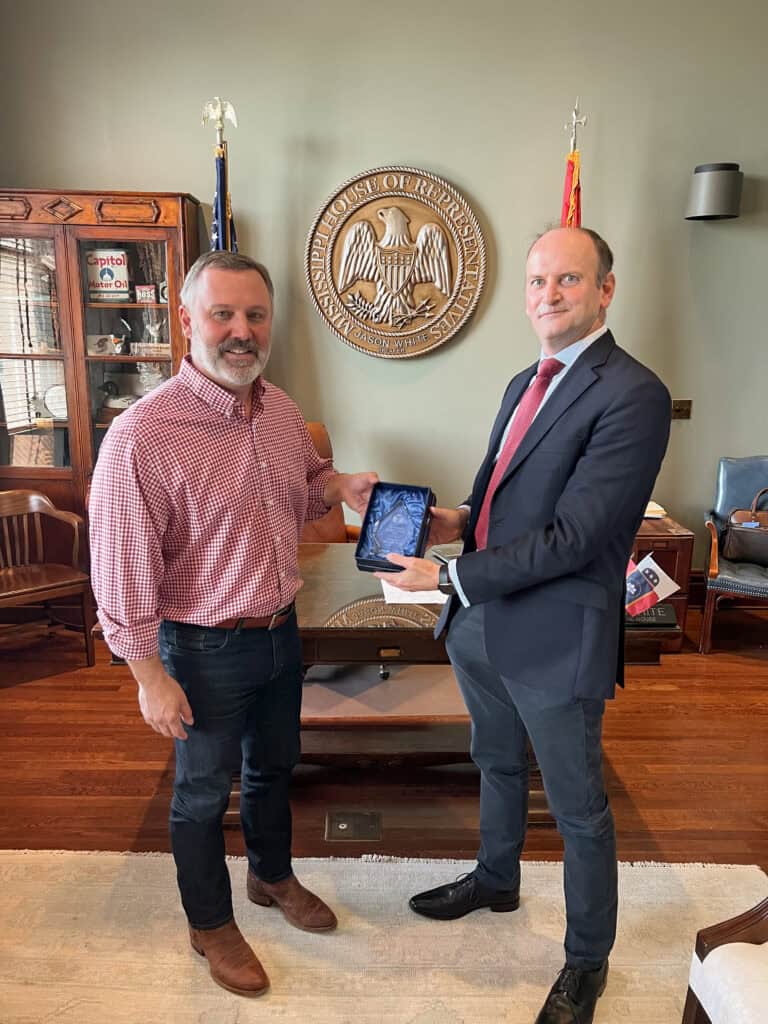House Speaker, Jason White, addressed a packed lunch time meeting hosted by the Mississippi Center for Public Policy in Jackson.
Speaker White talked about what had been accomplished during his first session as House Speaker, and shared his priorities for the future.
Notably, under Speaker White’s leadership the House:
- Authored and achieved historic school funding reform so that Mississippi will now fund students, not a system.
- Voted to restore the ballot initiative process.
- Voted to overhaul Certificate of Need laws that intentionally restrict the number of healthcare providers.
- Voted for the SAFER Act to protect women’s spaces.
The Senate might have subsequently blocked the restoration of the ballot initiative and Certificate of Need reform, but both school funding reform and the SAFER Act have since passed into law.
“There was enormous interest in what Speaker White had to say” said Douglas Carswell, MCPP CEO. “Rather than skating over subjects, the Speaker went into tremendous detail.”
“While praising public schools, Speaker White talked about the need to allow money to follow the student within the public school system.”
“He also talked about Certificate of Need laws and the need to review the impact of such laws of restricting access to health care in certain areas.”
“MCPP loves hosting conservatives, and there was real warmth towards Speaker White and what he had to say.”
When running for President in 2020, then-candidate Joe Biden promised to “defeat the NRA” by banning assault weapons and enacting other radical gun control measures. After recent mass shootings in Buffalo, New York, and Uvalde, Texas, President Biden signed gun control legislation into law, but did he deliver on his campaign promises?
The latest ‘red flag’ law being debated in Washington increases mental health funding, closes the so-called “boyfriend loophole,” which aims to prevent unmarried domestic abusers from acquiring guns, and most controversially, incentivizes states to adopt “red flag laws.”
Red flag laws allow citizens to go to court to seek an order permitting law enforcement to seize the weapons of a person who has exhibited behavior indicating they might be a threat to themselves or others. Conservatives, wary of big government abuse and overreach, say red flag laws could be used to target people over political beliefs. For example, someone’s leftist ex-girlfriend could pursue a court order against them for posting a picture with guns or sharing a “dangerous” opinion on social media, and if one judge deems it appropriate, those guns could be taken away for some period of time.
Yes, this new law is another step in the left’s march toward stronger gun control laws, but it does not ban assault weapons or deliver any other major progressive “wins” that President Biden promised. Biden admitted this himself, saying that “this bill doesn’t do everything I want.” Other members of the President’s parties have made even more extreme gun control promises than Biden. Texas Governor Candidate Beto O’Rourke, who has lost two elections within the last four years, famously said “hell, yes” in response to whether certain guns should be taken away by law-abiding gun owners. New York Governor Kathy Hochul said that she is prepared to enact gun control so extreme that her state will “go back to muskets.”
Democrats control both chambers of Congress and the presidency, but they still cannot deliver on their anti-second amendment crusade. As their political capital diminishes, their promises become increasingly vague, from an assault weapon ban to “common sense gun reform” to simply “doing something.” This catch-all phrase is designed to create the façade that something truly special has happened thanks to the President’s leadership when, in reality, that is nowhere near the truth.
Meanwhile, the Supreme Court has struck down a New York law that required citizens to show “proper cause” to get a concealed carry gun license. According to the left, the right to bear arms is dependent on if the anti-gun government thinks the specific reasoning for doing so is good enough. Thankfully, the Supreme Court can recognize an unconstitutional infringement when it sees one. For the past thirty years or more, the anti-gun lobby has promised a lot. But they don’t have an awful lot to show for it.
Today the Mississippi Senate and House appear to have reached a compromise deal on income tax cuts.
Commenting on the news, President & CEO of the Mississippi Center for Public Policy, Douglas Carswell said:
“This tax cut is great news for Mississippi. With the cost of living rising, exempting every Mississippi worker from paying income tax on the first $18,000 earned is welcome.”
“It is good that some of our state’s $1.2 billion surplus is being used to give taxpayers back some of their own money. However, this package is more modest than we would like to have seen.
“This is a good first step but it is not full income tax elimination. Under this proposal, in 2026 the legislature will still need to agree further reductions.”
“There is a danger that the Mississippi government will not tax to get the money it needs, but finds a need for the money it gets”.
“While this a step forward towards eventual income tax elimination, Mississippi still needs bold, game-changing policy changes if our state is not to continue to rank 50th out of 50 states by many metrics”.
In just a few days, a new legislative session will begin. Our state representatives and senators will be considering a range of bills that could have a major impact on our lives.
While some entrenched interests fight to protect their own industries and pocketbooks, our aim is quite the opposite. We seek to defend and expand freedom and ensure that the rights and liberties of each Mississippian are defended under the dome of our capitol building.
Recognizing this, we are launching a coordinated strategic press to advance a range of policies that we believe will empower free markets and free people in our state.
Here’s a look into what we’ll be fighting for this session:
Bills to Combat Critical Race Theory:
1. Combat Critical Race Theory
Having published a paper highlighting how Critical Race Theory is being advanced in our state, we are supporting legislative efforts to ensure that no public money be spent to promote this divisive ideology.
2. Promote Academic Transparency
A key way to combat the presence of toxic ideologies in the classroom is to require schools to publish details of what is actually being taught to our young Mississippians. We support legislative efforts to do exactly that.
Bills to Extend Economic Liberty:
3. State Income Tax Abolition
A number of Southern states like Texas, Florida, and Tennessee have already eliminated or are working to eliminate the state income tax. This policy proposal may be the best way to bolster the Mississippi economy and make us more competitive in the region.
4. Red Tape Reduction
Mississippi is burdened by far too many boards, commissions, and states agencies that are constantly pushing new regulations onto the people. Big businesses can navigate this minefield of market obstacles, but small businesses and entrepreneurs are often stifled. We want to mandate a significant scaling back of the existing regulatory landscape.
Bills to Improve Education:
5. Open Enrollment in Education
To improve public schools in Mississippi, we need to give moms and dads more control. We seek to allow parents who are dissatisfied with their current school systems, the ability to send their child, and their tax dollars, to a different school of their choice.
6. Cap School Board Administrative Costs
Too much of our education budget is spent on administrative costs and bureaucratic salaries. We support efforts to ensure that more money goes into the classroom instead.
7. Establish Multiple Charter School Authorizers
Charter schools are meant to offer families a better future for their kids. But a decade since they were allowed to be authorized in Mississippi, there are still far too few of them. We want to streamline the authorization process and encourage the expansion of education freedom.
8. Free Speech on Campus
We need to protect freedom of speech for college students on our state campuses. We want to ensure that peaceful assembly, protests, lectures, petitions, and literature distribution will be allowed.
Bills to Improve Healthcare Provision:
9. Repeal Certificate of Need
Mississippi has some of the worst health outcomes in America. One reason for this is that we have some of the most severe restrictions on the expansion and creation of healthcare facilities. Certificate of Need (CON) laws mean that no new health care provider can come along and offer services without the express permission of competitors. This makes as much sense as allowing a Pizza Hut to block the building of a Papa John’s because of the potential for competition. We aim to get rid of this incredibly outdated policy.
10. Repeal of Moratorium on Home Health Agencies
With more folks than ever seeking to get medical care from the comfort of their own homes, we support legislation that would make it easier to offer medical access directly. Our system currently makes this almost impossible.
Bills to Encourage Technology & Innovation:
11. Agricultural Incubator
A major portion of Mississippi’s economy is comprised of agriculture. We would like to empower innovators and small businesses to bring new technology to market with reduced regulatory burdens that could allow for Mississippi to become the nation’s leader in the field.
12. Reduce Barriers to Telemedicine/Telepharmacy
In an age of unprecedented integration between digital technology and daily life, we believe that Mississippians should be allowed to access their healthcare systems and doctors using modern devices.
When I first moved to Mississippi, one or two of my friends back in England raised their eyebrows. “Mississippi!” the expression of their faces seemed to say. Like many people who’ve never had the good fortune to live in this state, when they hear the word “Mississippi”, they think of the river, or a riverboat or cotton field, perhaps.
Maybe it’s time for such folk to think again. Mississippi has real economic momentum.
Our state is the second-fastest growing economy nationwide. In 2024, Mississippi’s real GDP grew by an impressive 4.2%, ranking second in the U.S. and adding $1.27 billion to our economy. We have also seen some remarkable income growth, ranking fifth nationally for per-capita personal income growth in Q3 2024. A record flow of inward investment is coming into our state, while a record $14 billion a year of exports in goods goes out of our state abroad.
For as long as anyone can remember, young people have been leaving Mississippi. Not anymore. SEC colleges have become fashionable, in part perhaps because they are less ‘woke’ than public universities elsewhere. The number of students at Ole Miss and Mississippi State has risen sharply over the past five years.
Soon after I started at the Mississippi Center for Public Policy, a think tanker from another state told me in jest that when they looked at any set of indices about their state, they would say “Thank goodness for Mississippi”. Apparently, our reliably poor performance meant their state would always escape being bottom of the class. That joke doesn’t work anymore.
Mississippi just led the way in passing legislation to eliminate the income tax. We’re the first state to have managed that since oil-rich Alaska in 1980. Other states are now using Mississippi tax reforms as the model to follow.
Our state pioneered labor market reforms to occupational licensing that have helped drive growth. Mississippi has shown other states how to do it.
If you want low cost energy, Mississippi gives you a pretty good guide as to how to do it, too. The average residential rate in our state is 14 ¢/kWh, among the lowest in America, and about a third of what it costs in California. A decade or so ago, Mississippi led the way insisting that children be taught to read using phonics. This accounts for our relative (if not so much absolute) improvement in reading scores. Your support helps fuel this Mississippi success.
Our state might be showing the way, but we also have a lot to learn from other states, particularly when it comes to school choice. Families in Tennessee, Arkansas and Alabama are now able to apply to get control over their child’s share of the state education budget. There’s a lot more we need to do to get rid of red tape. Mississippi just passed the most conservative budget in years, and we need to keep control over public spending in our state.
Each day when I wake up, I’m not just grateful to be in America. I’m delighted to be in Mississippi.
Immigration is the most critical issue facing America. In recent weeks, ICE has been busy. There have been lots of raids and approximately 800 daily arrests of illegal immigrants nationwide. The administration wants one million deportations this year. In Los Angeles, this crackdown triggered protests that turned violent. President Trump has now sent National Guard troops and even a small number of Marines to enforce the law. Leftwing agitators in other cities seem to be gearing up for more protests.
I’m not sure that siding with violent protesters waving foreign flags is going to win the left mainstream support. Indeed, some of the images from Los Angeles will only alienate middle America. Polls now show 65% support for mass deportations. As Stephen Miller, Trump’s chief of staff, wryly observed, such protests could boost the President’s approval rating past 60%.
For years, immigration rules have simply not been enforced. As an immigrant to America that came in via a laborious and costly process, it annoys me that other people can come in by simply ignoring the rules - and the authorities turned a blind eye.
It is vital that Trump wins the fight to be able to remove those that come into America illegally. If you don’t have borders, you won’t have a country. Don’t just take my word for it. Look at what is happening on the other side of the Atlantic. Today, only around a third of school children in London are English. Sweden is projected to be 30 percent Muslim by 2050. Austria and Germany 20 percent and Britain almost 18 percent.
Today not a single nation in the Western hemisphere has a total fertility rate above replacement level – not even Haiti. Birth rates everywhere from Mexico to Chile have nosedived.
What this means is that if America fails to control her borders and remove those that come here illegally, you may not get the immigration you think you’re going to get. You could end up with a very different sort of America. What if the melting pot won’t melt? What if cultural convergence becomes cultural divergence? America needs an immigration policy that works for America’s long term interests and is enforced accordingly. I fear that unless Trump wins this fight, no one is going to bother enforcing immigration law again. If that happens, the consequences would be catastrophic.
Mississippi seems to be doing rather well. Our economy is growing, and according to data from the U.S. Bureau of Economic Analysis, Mississippi was one of the fastest growing states in the last quarter of 2024. Personal incomes are rising faster than inflation.
Our state is heading in the right direction because we’ve got some key policies right. Taxes, notably the state income tax, have been lowered, with eventual income tax elimination in sight. Rules on occupational licensing have been reformed, making our labor market more flexible.
Our state government has (by and large) kept public spending under control, meaning we have a budget surplus. We don’t yet have meaningful school choice. But every child in the public school system does now have a personalized budget, making it harder for the education bureaucracy to squander resources and easier for the dollars to follow the child.
Every one of these wins was achieved because a handful of people were prepared to put their neck on the line and fight for it. Each time they were opposed by vested interests and, frankly, by the go-along-to-get-along apathy of some who ought to have known better.
We’re only on the road to income tax elimination because principled conservatives were bold. Previous Speaker Philip Gunn overcame opposition to lower income tax to a flat 4 percent. Current Speaker Jason White outmaneuvered the forces of inertia facing him to secure legislation that will mean eventual elimination. Governor Tate Reeves made the case for it consistently.
At every stage, the Governor and two Speakers were attacked for their stance, notably in various leftist-sponsored media outlets. Sometimes by those that now claim credit for the tax cut. Mississippi’s legislature has just passed one of the most conservative budgets in years only because the House leadership refused to do business-as-usual. They insisted on a proper budget setting process – and if you remember, were repeatedly lambasted for it.
Efforts to ensure every child has a personalized education budget were often fiercely resisted by folk that now claim it was their idea all along. That’s politics, you might say. And it’s how change happens. A new consensus comes about not because everyone gets together for kumbaya, but because good ideas take on and defeat the bad.
Mississippi is on the up, but there are so many more reforms we need to ensure we’re no longer 50th out of 50. We are now surrounded by states that have school choice. Red tape in our state is restricting growth. Despite an impressive recent improvement, far too many working age adults in our state aren’t working.
It’s not naïve optimism that will deliver school choice or red tape reduction, but robust, unflinching advocacy. It’s time to turn up the volume.
At the end of May, Mississippi lawmakers returned for a Special Session to finalize the state’s budget after failing to reach an agreement during the regular session. The result? A more conservative budget.
For years, Mississippi’s budgets were decided behind closed doors over a single weekend during the session. Speaker Jason White and the House changed that by demanding an open, public process.
Speaker White’s commitment to transparency paid off. When Governor Tate Reeves called the Special Session, he urged fiscal restraint. This matters because Mississippi’s general fund has grown far faster than inflation since 2020.
Lawmakers listened, passing a $7.1 billion budget — a modest increase from last year and one of the most fiscally responsible in recent years. The big spend items are $3.3 billion, for education, $1.4 billion for Transportation and $431 million (up from $407 million) to try to improve our dysfunctional prison system.
Speaker Jason White was right all along. When lawmakers decide the budget in public through a proper process, they are more careful with our money. Sunlight truly is the best disinfectant.
One subplot to the budget saga merits attention. Some Senate members made a misguided attempt to cut basic funding for the State Auditor’s department, hindering its ability to function. This echoed attempts by leftist politicians in Washington, D.C., to block DOGE from auditing federal funds.
Every conservative in Mississippi should applaud the House for standing firm and restoring the State Auditor’s funding. The Auditor can continue investigating misuse of public funds. (Why would any politician scheme to block the Auditor from scrutinizing tax dollar spending? Did they really think they could do so and not look ridiculous? If Homer Simpson did political strategy, I doubt he’d make that mistake. It is political positioning 1.0.) Restraining public spending matters in Mississippi for several reasons.
First, all those efforts to pass a law to eliminate the state income tax over the coming year will amount to little unless we continue to maintain a budget surplus. The budget passed will maintain a modest surplus and sets a precedent that puts us on the road to actual income tax elimination.
Second, if Mississippi’s economy keeps growing at a rate of 3-4 percent a year, and the budget only grows by 1-2 percent a year, the size of the private sector will grow relative to the overall economy. This is the only way to lift Mississippi over the next generation from being one of the poorest states in the Union to being one of the richest.
Perhaps the most significant thing about this year’s budget is not just that it is fiscally restrained. It was decided openly and transparently. The days when billion-dollar decisions could be made by a handful of good ole boys at the Capitol in private are coming to an end.
A new generation of leaders is emerging in our state who not only support pro-growth policies. They aren’t willing to keep doing politics like its 1960-something.
What is the secret of America’s success? Federalism. Thanks to the genius of the Founders, each state is allowed to do things differently, which enables innovation.
It is so exciting to see Mississippi now leading the way with bold, free-market reforms that have begun to unleash growth, providing a model for other states to follow.
After decades being last, Mississippi is has started to see some remarkable results:
- Explosive Economic Growth: In 2024, Mississippi’s real GDP grew by 4.2%, ranking 2nd nationally, outpacing California (2.1%), New York (1.8%), and Texas (3.9%), per the BEA’s Q4 2024 data. Nominal GDP jumped 6.7% ($2.58 billion), also 2nd in the nation.
- Surging Incomes: Personal income growth ranked 4th nationally in Q3 2024. From 2000 to 2022, per capita income soared 140% (3.6% annually), from $21,500 to $46,200. With our low cost of living, Mississippians are enjoying one of the most rapid increases in living standards in America.

Mississippi personal income has increased rapidly
- Global Competitiveness: Being a British immigrant, I was fascinated to see that in 2023, Mississippi’s per capita output surpassed the UK’s. Even better, this year, we’re projected to overtake Germany’s per capita output.
- Investment Boom: Over $20 billion in new investment projects have been announced in the past couple of years. That means private dollars are investing in the future of our state because they think we have a great future.
This economic renaissance didn’t happen by accident. Growth is a direct consequence of the kind of free market reform MCPP has been advocating for:
- Historic Tax Cuts: In 2022, Mississippi passed the largest tax cut in state history, phasing in a 4% flat income tax by 2026.
- Labor Market Deregulation: By reducing red tape, we’ve empowered businesses to hire and innovate, boosting job creation (some estimates suggest 56,000 export-related jobs in 2022 alone).
- Conservative Budget Responsibility: A steady budget surplus has been important.
- Low cost energy: Mississippi managed to avoid a lot of the renewable energy policies that have pushed up costs in places like California.
We need to maintain this new momentum – and to do that there are plenty more policy changes we must make. Education standards are not as good as some would like to suggest. It is vital that we allow school choice. There are far too many red tape restrictions holding back the local economy, especially the protectionist rules in the healthcare sector.
Most important of all, perhaps, our state leaders need to restrain public spending, which has increased rapidly. We need to ensure that we continue to control spending so that we maintain modest budget surpluses.
But let’s take a moment to recognize that Mississippi is actually doing rather well. So much so, in fact, that other states might have something to learn from what our state leaders have got right.
President Trump has established a baseline 10 percent tariff on nearly all imports. Additionally, the White House announced plans for reciprocal tariffs on 57 countries. A week later, on April 9, the administration then paused these reciprocal tariffs for 90 days.
We don’t know if the reciprocal tariffs will take effect after July 9. What is certain is that in addition to the 10% baseline tariff, there is a 25% tariff targets car imports and most goods from Canada and Mexico, and a staggering 125% tariff is in place on most Chinese imports.
Some of my conservative friends like to imply that tariffs are part of a cunning plan to eliminate the federal income tax. They point out that until 1913 America did not have a federal income tax, and the federal government was largely funded by tariffs.
Now I’m all in favor of eliminating income taxes, and I spent much of the last legislative session in Mississippi advocating for the repeal of our state income tax. But the numbers don’t add up for replacing the federal income tax with tariffs. To generate the $2.6 trillion annually that the income tax provides, tariffs would need to average 127% on all imports (even accounting for an estimated 20% drop in import volume). Do that and only rich folk will be able to shop at Walmart.
Others have told me that we need these tariffs to protect American industry against offshoring and the loss of American jobs overseas. Really?
US output today is close to three times higher than it was when LBJ was President. US factories make almost twice as much stuff as they did when Ronald Reagan left the White House. The growth in US industrial output happened while tariffs declined from 6-8 percent in 1969 to about 2 percent by 2010 (with a slight increase by 2020 due to higher tariffs on China).
It is true that the number of manufacturing jobs in America has fallen, as manufacturing output has risen. But that is because fewer workers in industry are able to make more. The same thing happened in farming a century before. The loss of farming or manufacturing jobs has not made Americans poorer. It means Americans went and found work in better paying jobs.
That’s why the total number of jobs in America has risen despite the fact that the proportion of Americans working in manufacturing has fallen. There were 70 million jobs in 1969 and there are 160 million jobs today. So much for free trade taking away our jobs.
“But what about China?” some say
America should be worried about China. It’s alarming that China’s Jiangnan Shipyard builds more ships in a single year than all U.S. shipyards combined. It’s concerning that China produces more drones in a day than the U.S. does in a year.
But if China is our primary concern, why hit countries like Vietnam, South Korea, and India—potential competitors to China—with crippling tariffs?
Tariffs won’t eliminate the federal income tax, reverse a supposed industrial decline, or solve the question of how to deal with an aggressive China. What they will do is make you poorer and America less competitive.
Consider your cell phone. Apple has already stated that tariffs will increase its costs by nearly $1 billion this quarter alone. That extra cost? It’s coming out of your pocket when you buy your next iPhone. To dodge new tariffs on Chinese goods, Apple is shifting much of its manufacturing from China to India. Don’t expect new iPhone factories in Mississippi or Michigan—think Madras instead.
Ironically, the high-value work on smart phone production—the design, software, and chips—is already done in the U.S. Tariffs will simply move low-value assembly from one Asian nation to another, leaving you to foot the bill.
My big fear this that tariffs won’t just be seen as having triggered an economic downturn. By doing so they will overshadow all those other conservative wins.
During my recent trip to Washington, several administration insiders suggested that the current tariff strategy is part of a broader plan. They claim tariffs are being used as leverage to dismantle restrictions on U.S. exports to other countries.
Whether or not this was the original intent, I hope it becomes the retrospective rationale. For instance, if a close ally like the UK, which runs a trade deficit with the U.S., agreed to eliminate all its tariffs and allow any product sold in America to be sold in the UK, the U.S. could respond in kind. Such a trade agreement with the UK could set a precedent, encouraging other allies—Japan, India, Australia—to follow suit. The result might be the complete removal of trade barriers between the U.S. and its allies. That’s the optimistic scenario. The alternative is higher costs for everyone, leaving us all poorer.
Mississippi is on the move. Over the past five years, economic output rose more than it did over the previous fifteen.
According to data from the Federal Reserve Bank of St. Louis, Mississippi’s economic output has soared by $41.4 billion, climbing from $116.1 billion in 2019 to $157.5 billion in 2024. That’s more growth in half a decade than we saw in the previous fifteen years combined.

This growth did not happen by chance. It came about thanks to deliberate, pro-growth policies that are transforming our state.
In 2021, we saw labor market deregulation with a bill to reform occupational licensing. Then in 2022 came a substantive tax reform bill, which paved the way toward the income tax elimination bill passing in 2025. At the same time, Mississippi has kept energy costs low and rolled out the red carpet for inward investors.
Every one of these victories came about thanks to principled conservative leaders who fought for change against fierce opposition from leftist lawmakers wedded to the status quo. At the time that these reforms were proposed, there was no kumbaya consensus in favor of any of it. Change only happened because a handful of conservative leaders – and dare I say it conservative organizations - were willing to go out on a limb for it.
The Mississippi Center for Public Policy (MCPP) recently honored some of those in our legislature that truly are committed to this pro-growth agenda, and we should all celebrate their determination.
But the question remains: Is your local lawmaker part of Mississippi’s new pro-growth agenda, or are they standing in the way?
Did your own Representative and Senator help lead Mississippi’s growth, or are they one of the one’s that opposed everything but showed up for the cameras?
Despite Mississippi’s strong conservative majority, we often fall short on basic conservative priorities like school choice. Too many solid bills mysteriously “die in committee” with no explanation, no recorded votes, and no accountability. Lawmakers who oppose pro-growth policies have gotten away with vague soundbites on Supertalk, dodging any real consequences. That ends now.
The new Mississippi Freedom Index, which you can access by logging on to our website at mspolicy.org, empowers everyday Mississippians to hold their representatives accountable. This tool shows how your lawmaker voted on key pro-growth policies, details their campaign finance contributions, and even lets you message them directly.
We’ve identified four flagship growth policies that define Mississippi’s economic surge—any lawmaker who opposed them doesn’t meet our definition of a conservative, plain and simple.
So, where does your representative stand? Log on to mspolicy.org and click on the Freedom Index to find out. If any lawmaker disagrees with their rating, they’re welcome to reach out. They can post their remarks, or if they’re willing to publicly commit to supporting the policies they didn’t vote for, we’ll reconsider their score.
Mississippi is on the rise. Check the Freedom Index today—because our state’s future depends on leaders who deliver, not ones who hide.
Jackson, Miss. — The Mississippi Center for Public Policy (MCPP) proudly announces the recipients of the 2025 Mississippi Freedom Awards—an annual tradition that honors the lawmakers who boldly champion liberty, economic growth, and individual rights during the legislative session.
“This year, we set an ambitious agenda: eliminate the income tax, expand school choice, push back against divisive DEI initiatives, and reduce the red tape stifling healthcare,” said MCPP President Douglas Carswell. “Thanks to courageous leadership in the Legislature, we’ve secured historic victories for Mississippi families.”
Among the honorees are several standout lawmakers:
- Representative Trey Lamar led the successful charge to eliminate the state income tax. Working closely with Speaker Jason White, Lamar’s transparent and thoughtful approach exemplified what pro-growth policymaking should look like.
- Representative Jason White, Speaker of the House, is recognized as the 2025 House Hero for uniting and leading on key reforms, most notably the income tax overhaul. His steady leadership continues to chart a path for prosperity.
- Senator Angela Hill, named the 2025 Senate Hero, took bold action to fight harmful DEI mandates and stood firm for educational and individual liberty.
- Representative Jansen Owen was honored for his tireless efforts to expand school choice in Mississippi through HB 1435, pushing a policy that would bring Mississippi in line with neighboring states.
- Representative Hank Zuber III was recognized for his long-standing work to reform healthcare regulations and push back on outdated Certificate of Need laws, aiming to improve access and competition in the state’s healthcare system.
- Representative Sam Creekmore earned recognition for his focused efforts to cut red tape and streamline processes that hinder economic development. With a pragmatic and solutions-oriented mindset, Creekmore worked to identify and remove bureaucratic barriers that stall progress across sectors—particularly in healthcare and infrastructure. His commitment to smart, conservative reform has made him a valuable force in the push for a more efficient and responsive government.
“These lawmakers didn’t just vote the right way—they led the fight,” MCPP noted in a statement. “When others hesitated, they stood firm for freedom.” While not every legislative priority crossed the finish line this year, the victories achieved mark serious momentum for pro-growth reform. With income tax elimination and anti-DEI legislation now enshrined into law, Mississippi continues to position itself as a beacon of freedom and innovation in the South.










